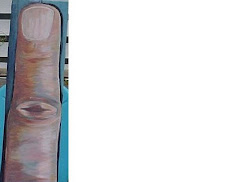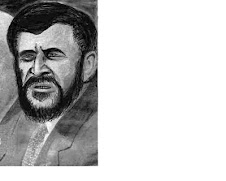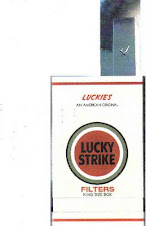Look Who's Back ... why it's none other than Adi Shicklgruber! That's the theme of this German film that depicts Hitler waking up outside the bunker in which they torched his body in 1945, only it's 2015 and he rises Lazarus-like from a smoldering grave without having aged a bit, and very much the Adolph we've all come to know and love ... to revile. And promising, matched word-for-word by the braggadocio of our own current resident of 1600 Pennsylvania Avenue, to "Make Germany Great again" (including the implicit underlying message of, "Whatever it takes").
But, as if to give credence to the adage that history repeats itself, first time as Tragedy, the second time as Farce", the current brandisher of the phrase, "Make (fill in the blank) Great Again", has it emblazoned on a baseball cap instead of military headgear, and wears a flag on his lapel instead of the Swastika The Furor wore on his, to convince the proles that he cares about the country while his machinations only further its cataclysmic destruction. But, so as to mimic the Fuehrer, whom he admires as only a fellow-German can (his current moniker "Trump" was chosen to replace the family's actual name of Drumph, so as to hide their German roots), his entire strategy for his Presidential campaign was lifted entirely from the movie, not the least of which is his stated belief that only He can save the Vaterland by steering the Leviathan, via his own appointed SS, directly onto the path of disaster that would make his name immemorial while destroying his country, whose people matter to him not a jot, via the same undisguised and unapologetic, foaming-at-the-mouth desire for Weltherrschaft (World Domination). A desire his compatriots, for the most part (despite their insistence that they live in a Democracy (the two are incompatible)) readily share. One of the first things the resurrected Hitler notices is, of course, TV, a powerful propaganda technology he can't believe is wasted on cooking shows and programs to teach the correct application of make-up.
But as the cameras chronicle the behind-the-scene ratings grabs that the current wasteland of advertising-revenue-controlled programming has become, it is apparent that the lessons the Furor (sic) learns were not lost on Drumph. All objections to the unsavory nature of giving airtime to this comedian (naturally no one believes it's the real Furor) are shouted down as the ratings tick up, highly reminiscent of the period before the last American election in which the media - papers, TV, and radio - all fell over each other in order to show the latest outrageous statement of the orange-haired Bozo running for the highest office in the land, castigating what he said by giving him coast-to-coast, all-Drumph-all-the-Time, coverage, such that his campaign spending was for all practical purposes nil, as each media outlet strove to be the first to broadcast his bromides while they watched in glee as their ad revenues went through the roof, setting all-time records for "news" programs, which they are still called despite their descension into the realm over which the candidate they so assiduously bemoaned reigned supreme: Reality TV.
What's the difference anyway? News/Reality TV ... aren't they after all just different names for the same thing?
In the final scenes in the movie, when the fired newsman Sawartski, who first brought the resurrected Furor to his countrymen's attention, realizes that somehow, inexplicably, this IS the real Hitler, he confronts him and tells him that he won't let him do it again; he won't allow him to sway the public with his propaganda. But, Hitler argues, it was not propaganda in 1933. The Germans were told in full what his plans were and they put him in office nonetheless. Not, similar to Drumph's election in the US, by a majority, but by the votes of more than 13 million Germans who cast their ballots in his favor, even though Hitler hoped to use the presidency to overturn the Weimar Constitution, just as Drumph questions the relevancy of our own, since it overrides his conviction that no matter how foolhardy and ridiculous his campaign promises were, they should be rushed into fulfillment for no other reason than they reflect his Will.
Upon the surreal discovery of his real identity, Sawatzki takes him by gunpoint to a highrise rooftop where he accuses him of being a monster. But Herr Hitler disagrees,
"I am not a monster", he insists, "They were just ordinary people who decided to elect an extraordinary man, and entrusted the fate of their nation to him. Have you never asked yourself Sawatzki why people follow me? It's because at their core, they're just like me. They share the same values."
"And that's why you won't shoot me."
Which words are barely out of his mouth when Sawatzki does exactly that. And we watch as the Furor's leather trench-coated body slips off the roof and plummets toward the ground. But as Sawatzki looks over the roof's edge, he sees no body, he only hears a voice behind him say,
"You can't get rid of me".
And as he slowly turns around to behold The Furor alive and well behind him, Herr Hitler continues,
"I am a part of you".
"A part of all of you."
In the final scene he rides in a motorcade waving to his fans, and he intones to himself as the camera shows scenes of mobs attacking immigrants, neo-nazis beating fags and protesters setting cars on fire, among other scenes of mayhem and displays of fear-fueled attacks on unarmed refugees, he looks around with a tight grin on his grim lips and gives his head a confident nod as he assures himself,
"I can work with this."
 |
| Himher: Not even his wife wants his name. |
 |
| Himmler: Fulfilled Fuehrer's Judenfrei Fantasies |



















































No comments:
Post a Comment